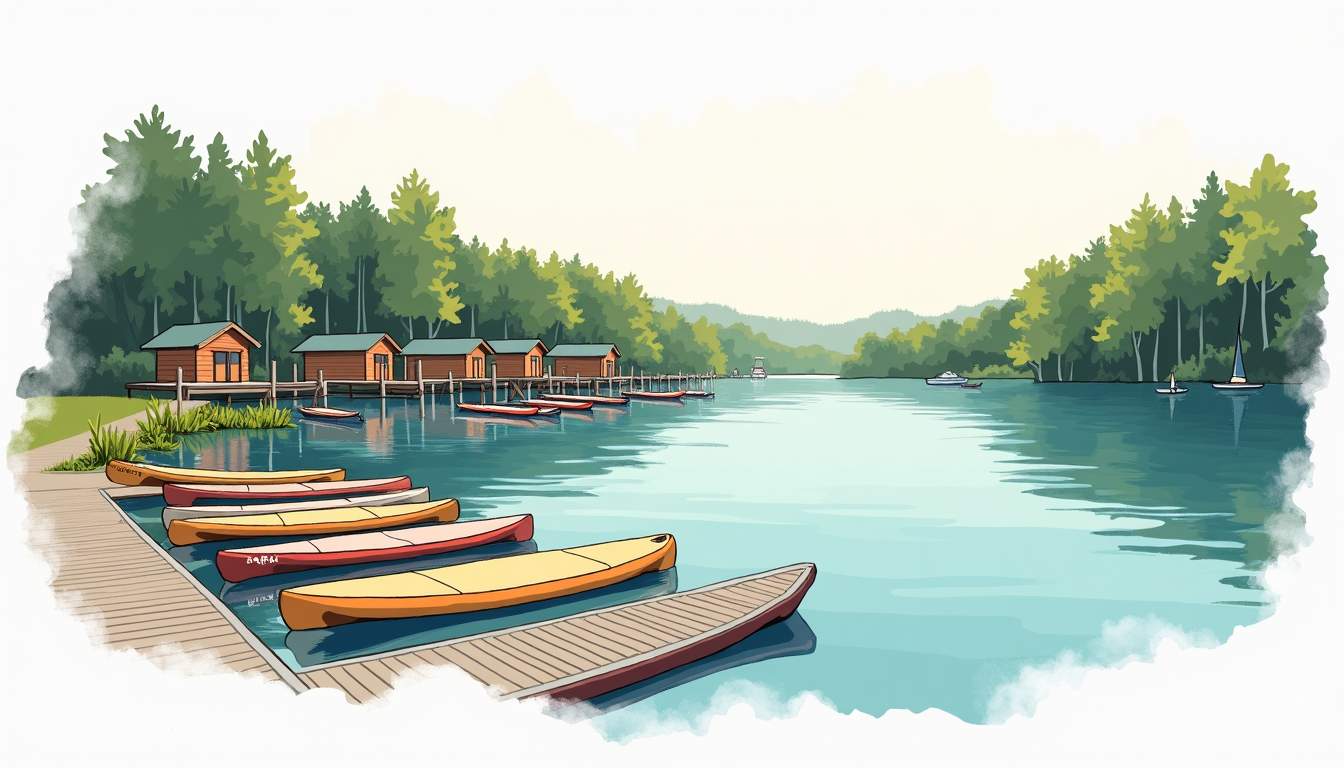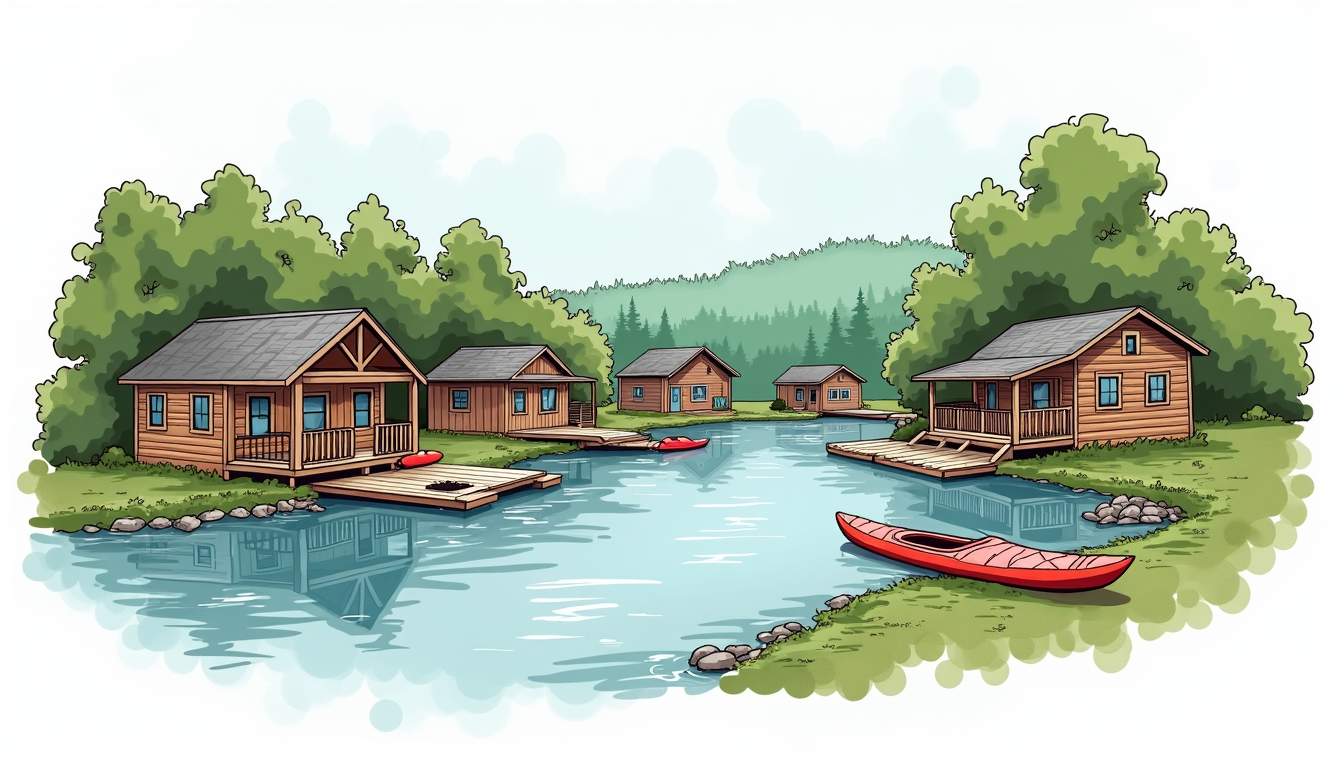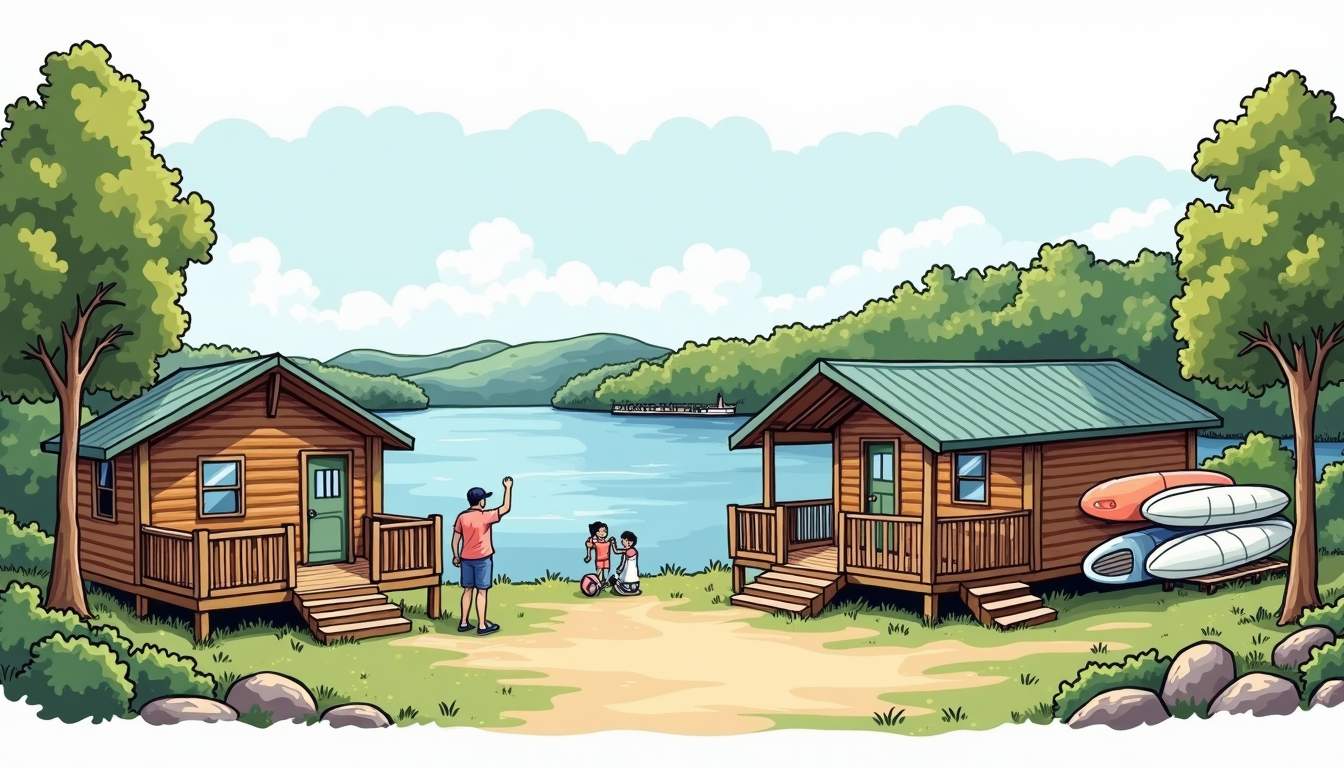
Watts Bar Lake offers a blend of calm coves, wide-open water and convenient marina access that makes it an appealing destination for paddleboarders looking to rent a waterfront home. This guide focuses on finding paddleboard-friendly rentals near Watts Bar Marina, understanding dock and storage options, exploring local paddle routes and safety considerations, and learning neighborhood etiquette to make the stay enjoyable for both visitors and neighbors.
Watts Bar Marina sits on one of the more navigable expanses of the Tennessee River system, with a mixture of protected inlets and long sightlines that suit both beginners and more experienced stand-up paddleboarders. Choosing a rental close to the marina keeps launch points convenient, allows for easy access to fuel and supplies, and often provides dock privileges that make bringing gear less of a hassle.
Beyond practical convenience, waterfront homes around the marina often include private or shared docks, shallow entry points, and views that create a relaxing backdrop for early morning paddles. For many renters, the ability to step out the door, clip a leash onto a board, and glide into water within minutes is the defining appeal of a paddleboard-focused getaway.
Waterfront rentals near Watts Bar vary from small lakefront cabins to larger modern homes with multiple bedrooms, boathouses, and extensive dock systems. Each type carries trade-offs in price, privacy, and amenities.

Smaller cabins or bungalows often cost less and provide a cozy, rustic experience with immediate water access. Larger properties may offer private piers, covered slips, or even dedicated storage for paddleboards and kayaks. Some vacation homes are part of communities that maintain shared docks, which can be a budget-friendly middle ground.
Private docks mean uninterrupted access and more freedom for leaving boards and small craft overnight, though some owners restrict overnight storage for liability reasons. Shared docks are usually more affordable but require respect for neighbors' space and schedules. Confirm rules about leaving gear unattended, tying up to slips, and charging electric winches before booking.
Boathouses and covered slips protect craft from sun and storms, and can be an excellent feature for long stays. Paddleboards stored on racks inside boathouses are less exposed to UV and will require less maintenance. Note that higher-end features like winches and boat lifts raise rental pricing, and some facilities limit their use to licensed operators.
Searching for a rental that suits paddleboarders involves a few specific priorities: safe shoreline access, dock storage or secure staging areas, proximity to calm launch points, and clear policies about watercraft. Listings that emphasize "lakefront," "private dock," or "water access" are good starting points, but the listing details and host communication reveal the real suitability for paddleboarding.
When evaluating properties, consider water depth at the dock, the presence of riprap or seawall, current and wind exposure, and whether the shoreline is rocky, sandy, or grassy. For beginners, look for gently sloping, sandy or grassy entry points; experienced paddlers might prefer deeper water and the ability to launch quickly for longer crossings.
Confirm dock access hours, overnight storage rules, whether the dock is shared, and if the property has an outdoor shower or rinsing hose for cleaning gear. Ask about nearby parking for vehicles towing small trailers, and whether there are steps or steep paths to navigate from the house to the dock. Also inquire about any seasonal changes to dock availability—water levels can affect access during droughts or high rainfall.
Many local outfitters provide paddleboard, kayak, and gear rental with delivery to the marina or directly to the rental property’s dock. Some vacation homes include basic boards and life jackets; others require all equipment to be brought or rented separately. If renting gear locally, confirm delivery and pickup windows and whether boards can be left at the dock between rental days.
Watts Bar offers a range of paddle experiences, from short, sheltered inlets ideal for beginners to longer routes for more ambitious paddlers. Waterways near the marina include quiet coves, mangrove-like reeds and marshy backwaters where wildlife is abundant, as well as wider channels suitable for longer excursions.

Look for sheltered coves and protected arms of the lake for short, low-wind loops that take 30–90 minutes. These areas usually have calmer water and less boat traffic, making them ideal for learning balance and practicing strokes. Early mornings are often the calmest and coolest time to paddle.
For paddlers seeking exercise and exploration, longer routes to nearby islands, bridges or channel points offer a mix of open water and protected stretches. Plan routes that allow easy bailout points at docks or public ramps in case of changing weather. Pay attention to navigation markers and avoid crossing busy channels during peak boating hours.
Safety on Watts Bar requires awareness of changing weather, water conditions, and boat traffic. Paddleboarders should always wear a Coast Guard–approved personal flotation device (PFD) or have it readily available while on the board, carry a whistle for signaling, and use a leash when appropriate for the conditions and skill level.
Local regulations may require lights after dusk, and some areas restrict watercraft during certain times or near specific facilities. Checking the marina's posted rules and local navigation guidelines helps avoid fines and unsafe situations. Always file a quick float plan with someone onshore indicating intended route and expected return time.
Open sections of Watts Bar can develop wind-driven waves that challenge balance on a board. Monitor the forecast and local helicopter or marina advisories for wind gusts. Larger boats create wakes that may arrive as unexpected waves; yield to larger vessels and cross wakes at a 45-degree angle to lessen the impact. Wearing a leash helps prevent separation from the board in choppy conditions.
Watts Bar is home to birds, fish and occasional mammals. Maintain respectful distance from wildlife and avoid disturbing nesting or feeding areas. Pack out all trash and avoid using sunscreens or soaps that contain harmful chemicals near sensitive shoreline areas. Minimizing noise and keeping pets under control preserves the area for everyone.
Staying in a waterfront rental near a marina means sharing a shoreline community with homeowners, boaters and marina staff. Noise control, respectful dock use, and clear communication with neighbors prevent conflicts and ensure the neighborhood remains welcoming to future visitors.

Observe posted quiet hours, dispose of trash in designated areas, and avoid monopolizing shared docks. If music or gatherings are planned, keep volume low and consider notifying neighbors ahead of time. Many long-term residents live on-site and appreciate guests who treat the place as if it were their own.
Never assume a dock or slip is available; confirm assignment with the property manager or dockmaster. Avoid leaving personal items like coolers, chairs, or gear on shared docks. If using a slip for an afternoon, remove boards and ropes when finished and avoid blocking access ladders and boat ramps.
Report any damage or hazards discovered near the dock or property immediately to the owner or rental manager. Keeping lines neat, trimming excess vegetation from launch paths and rinsing off gear before storing inside the house reduces wear and tear on surfaces and helps prevent invasive species from being transferred.
Peak season for Watts Bar tends to align with warm months and holiday weekends, making waterfront rentals more expensive and in higher demand. Booking several months in advance increases options for properties with private docks and paddleboard amenities. Shoulder seasons can offer lower prices and milder weather with fewer crowds.
Weekly stays often provide a better nightly rate than short weekend bookings, and longer stays create the opportunity to explore more routes and less-visited coves. Many owners charge cleaning fees, security deposits, and may require proof of renters’ insurance for watercraft use—clarify these costs upfront.
Water levels at Watts Bar can change with seasonal flows and dam operations. A dock that’s convenient in summer may sit high or low at other times. Check recent photos, ask the host about current water levels, and verify whether launch conditions are suitable for paddleboarding at intended travel dates.
Confirm whether the rental requires additional insurance for using the dock, leaving craft overnight, or operating motorized watercraft. Personal watercraft and boards can be covered under home or travel policies, but vacationers should verify limits and exclusions. Taking photos of the property upon arrival can help document condition and protect from unfair damage claims.
Pack a basic repair kit for boards (patches, valve tools), bring reef-safe sunscreen, and include a small paddle leash and whistle in personal gear. Favor quick-dry clothing, a brimmed hat for sun protection, and water shoes for rocky entries. Charge devices, bring a waterproof bag for phone and keys, and carry a small first-aid kit.
Arrive with a plan: identify nearby launch points, marina hours, grocery and supply locations, and emergency contacts. Leave a copy of the rental agreement and dock rules in the vehicle and respect any marina instructions. Renting locally for additional days is often possible when weather or water conditions are ideal.
Paddleboarding near Watts Bar Marina provides a satisfying mix of convenience, variety and scenic paddling. Choosing the right rental—one with appropriate dock access, storage, and shoreline characteristics—makes the difference between a frustrating stay and a seamless, restorative water-based vacation. With attention to safety, neighborly etiquette, and thoughtful planning, visitors can enjoy memorable paddles and make the most of the lake’s calm coves and open waters.
Whether seeking gentle morning loops, wildlife-rich backwaters, or longer day paddles, grounding the trip in practical preparation ensures more time on the water and less time worrying about logistics. Respect the lake, leave it cleaner than it was found, and the area will remain a valued destination for paddleboarders for years to come.
For those inspired by paddleboarding and waterfront rentals near Watts Bar Marina, Tennessee National offers an exclusive opportunity to embrace this lifestyle year-round. Enjoy luxury homes within a gated community featuring a private marina, scenic nature trails, and resort-style amenities designed for both relaxation and adventure. Whether seeking a move-in ready home or a custom build, you can experience the perfect blend of comfort and outdoor recreation. Schedule a Private Tour today and start making memories daily at Tennessee National.